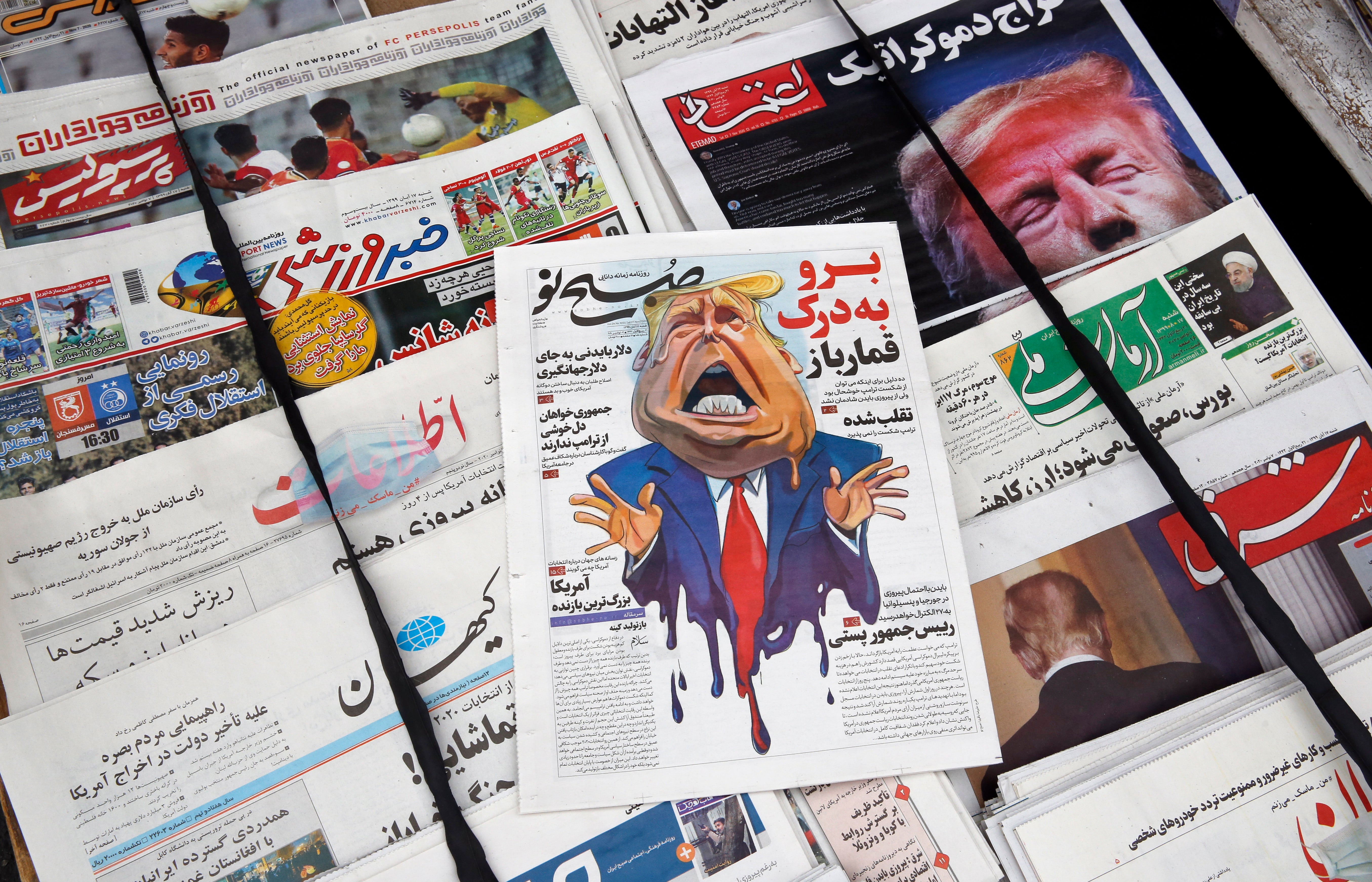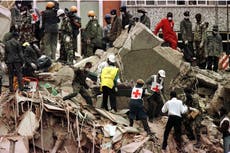Iran and US on collision course in Trump’s final weeks
Tehran plays down reports that Trump wanted to attack Iran’s nuclear sites

News reports suggesting that Donald Trump had to be persuaded not to attack Iran’s nuclear sites have been downplayed by officials in Tehran, but nevertheless underscored the prospect of a dangerous few weeks ahead in the Middle East amid fears the US president may be planning a final push against Iran.
The report in The New York Times, which was confirmed by The Wall Street Journal, described a meeting late last week in which several senior advisers – including the vice-president, Mike Pence; the secretary of state, Mike Pompeo; the acting defence secretary, Christopher Miller; and General Mark Milley, chairman of the joint chiefs of staff – purportedly convinced Mr Trump that it would be too risky to launch airstrikes on Iranian nuclear facilities, especially the uranium enrichment facility in the central Iranian city of Natanz, in the waning weeks of his presidency, which ends at noon on 20 January.
Iranian state broadcasters downplayed the reports, which cited unnamed sources, but officials warned of broad repercussions should any attack take place.
“I personally don’t foresee that it’s probable that [the US] would want to cause insecurity in the world and the region,” government spokesperson Ali Rabiei said in a briefing in Tehran. “Any action against the Iranian nation would certainly face a crushing response.”
The White House declined to comment, but the leak likely was meant as a warning to Iran not to make any brash moves in the final weeks of the Trump administration.
Such leaks from the administration to reporters are also often meant to bolster the statesmanlike reputations of those within Mr Trump’s orbit who hope to secure a political future for themselves after the divisive president leaves office. Mr Pence and Mr Pompeo both see themselves as potential heirs to Mr Trump’s political machine.
Concerns about a possible attack on Iran rose after the firing of Mark Esper as defence secretary in the wake of Mr Trump’s defeat, in addition to a series of trips by senior US officials to the Middle East that could be interpreted as attempts at back-channel communication. “It's likely that the US and Israel have something up their sleeves that can’t be mentioned,” The Jerusalem Post’s diplomatic correspondent, Lahav Harkov, wrote on Tuesday.
“There were a lot of rumours and concerns last week in Iran, the region, and the US that something was looming,” said Sanam Vakil, deputy director of the Middle East and North Africa programme at the think tank Chatham House. “A lot of people are worried, both within the administration and in other countries. There are no checks on the president’s impulses.”
Iran and the US have been engaged in low-level tit-for-tat attacks against each other across numerous theatres for decades. Fears of an all-out war spiked earlier this year when Iran launched missile attacks on a US base in Iraq after Washington assassinated Qassem Soleimani, the head of Tehran’s clandestine overseas commando force.
Since losing the 3 November election, the Trump administration has vowed to increase sanctions on Iran over the coming weeks, and is also pondering designating Yemen’s Iran-backed Houthis as a terrorist group, a move that would complicate efforts by international mediators to end a disastrous five-year war.
According to the report by The New York Times, the latest reported threat of military escalation came in response to a 11 November report by International Atomic Energy Agency inspectors detailing Iran’s growing stockpiles of enriched uranium and lack of adequate replies to questions about alleged nuclear facilities.
Iran claims its nuclear programme is meant for peaceful civilian purposes. However, US and other international intelligence agencies assessed that Tehran pursued a clandestine atomic weapons programme until 2003, and have concluded that it hopes to maintain a high enough atomic technology capability to give it the option to make a sprint for a bomb should it so choose.
Iran substantially cut back its enriched uranium production and other nuclear technology pursuits in exchange for relief from sanctions following the signing of the 2015 Joint Comprehensive Plan of Action. But Mr Trump pulled out of the deal in 2018 and launched a campaign of maximum pressure that has damaged Iran’s economy. In response, Iran began accelerating its nuclear programme last year.
Officials abroad fear that an embittered and emotionally unstable Mr Trump could use his final weeks as America’s first one-term president in nearly 30 years to settle scores and push through his agenda, which has overlapped at times with a small clique of Washington and Israeli hardliners demanding a military overthrow of the Iranian regime. Ms Vakil suggested that the recourse to military options amounted to the “death knell” of Mr Trump’s maximum-pressure gambit.
Iran has in recent years also built up its arsenal of conventional weaponry and sharpened its asymmetric tactics, including the alleged deployment of combat drones that have impressed military observers.
“Iran has proven to be capable of using its legitimate military might to prevent or respond to any melancholy adventure from any aggressor,” Alireza Miryousef, spokesperson of the Iranian mission to the United Nations, was quoted as saying on Tuesday by Iran’s semi-official Mehr News Agency.
Join our commenting forum
Join thought-provoking conversations, follow other Independent readers and see their replies
Comments


Bookmark popover
Removed from bookmarks